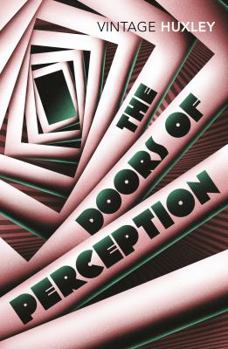The Doors of Perception
Select Format
Select Condition 
Book Overview
Discover this profound account of Huxley's famous experimentation with mescalin that has influenced writers and artists for decades.
'Concise, evocative, wise and, above all, humane, The Doors of Perception is a masterpiece' Sunday Times
Format:Paperback
Language:English
ISBN:0099458209
ISBN13:9780099458203
Release Date:January 2004
Publisher:Vintage Books USA
Length:125 Pages
Weight:0.28 lbs.
Dimensions:0.3" x 5.1" x 7.8"
Related Subjects
Consciousness & Thought Education & Reference Good & Evil Health, Fitness & Dieting Health, Fitness & Dieting Medical Books Pharmacology Philosophy Politics & Government Politics & Social Sciences Psychology Psychology & Counseling Religion Religion & Spirituality Self-Help SpiritualityCustomer Reviews
2 ratings
Mind-at-Large
Published by Thriftbooks.com User , 22 years ago
"The Doors of Perception" is probably the most popular non-fiction work on the subject of psychedelic experiences; it is based on first account records of the author's decision to experiment the consequences of intake of small amounts of mescalin, in an attempt to reach enlightenment and escape world's boredom. Being who he was, the result is a very interesting narrative in which the author expands on his not only scientific but also philosophical, religious, and artistic ideas.The philosopher C.D.Broad suggested that our brains are genetically programmed to screen perceptions, selecting only those that are necessary for survival. By doing so, humans close the doors to what Huxley calls "Mind-at-Large," thereby loosing access to the world of unconsciousness and wonder. Only through the use of chemical substances can a human being free himself from his inherited limitations, experience the realms of supernaturally brilliant visionary experiences, and obtain total freedom from the ego. In this new stage of consciousness, spatial and time relationships cease to exist, whilst intensity, profundity of significance are augmented. Our everyday reliance on language petrifies perception because "however expressive, symbols can never be the things they stand for." There is a need for a less exclusively verbal system of education and "an occasional trip through some chemical Door in the Wall!"Huxley's work is highly controversial and paradoxical. How are we to develop a science of perception if our language is not equipped to express that same perception? How are we to explain the differences in reaction to mescalin intake, ranging from peaceful and mystical to schizophrenic behavior? How are we to define individuals "with open minds and sound lives" who would be normally allowed to use chemical substances (drugs) with no risk involved? Let the reader keep in mind that this book was published back in 1954 and nowadays science is till dealing with these issues.In order to give an anwer as to why individuals react differently to drug intake, Huxley worte "Heaven and Hell." According to him, for some "the ego doesn't melt like an iceberg in tropical waters, but expands to the point of suffocation;" only those who are free from negative emotions (fear, hatred, anger) have the door opened to visionary experience.Aldous Huxley raises a number of interesting issues, not be taken as "chicken-soup for drugs," but rather as intellectual exercise for further thought and consideration as to what we most commonly refer to as "reality." His opinions and explanations may sometimes be considered "naive" and not fully elaborated, but merit goes to his audacity in exploring an area which to this day remains open to further understanding.
Credible Argument for Responsible Use of Hallucinogens
Published by Thriftbooks.com User , 25 years ago
In the first half of the book, DOORS OF PERCEPTION--originally a separate volume--Huxley offers a cogent and erudite argument for the use hallucinogens (specifically, mescaline) as a means for opening up the thinking mind to new ideas and perceptions, or even as a method for jumpstarting human creativity in the common man. Not only does he offer compelling historical precedents and sound medical research, but he also reveals positive details about his own personal experimentation with the drug. As is always the case with Huxley's essays, his various hypotheses are very articulately expressed and not easily dismissed.The second part of the book, HEAVEN AND HELL--also originally published separately--Huxley introduces the idea that spiritual insight and personal revelation can also be achieved through the use of hallucinogens. (By the time he had written this volume, Huxley had added LSD to his psychedelic repertoire.) While just as articulately written and researched as the first volume, the idea that religious insight can be gained through drugs may offend some readers (theists and atheists alike), and the premise seems odd and contrived or expedient (was he trying to gain support of the clergy?) coming from a generally non-theist thinker-philosopher such as Huxley. Nevertheless, it is still thought-provoking reading for both professionals and amateurs interested in the positive potential of mind-altering drugs.






